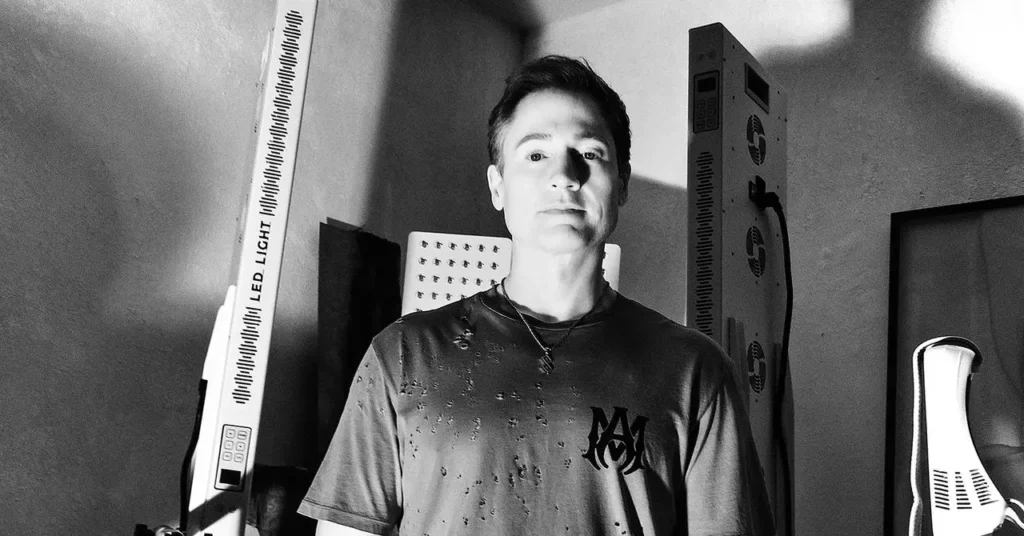In a societal landscape increasingly obsessed with eternal youth and technological mastery, Bryan Johnson epitomizes the modern archetype: a self-made billionaire fixated on defying the inevitable. His meticulously curated life, from pristine bathroom cabinets stocked with dietary supplements to a purportedly “healthy” body, reveals a profound denial of mortality. Yet, beneath the veneer of high-tech wellness, there lurks an unsettling reality: no amount of scientific obsession can outrun the natural course of life. Johnson’s relentless pursuit of longevity—sprinkled with plasma transfusions, elaborate monitoring, and questionable interventions—reflects a broader cultural arrogance. The belief that science can birth a new form of immortality is not only naïve but dangerously delusional. Humanity’s hubris in the face of nature’s immutable truth exposes the core flaw of this obsession: a refusal to accept our biological limits, which inevitably leads to spiritual and philosophical stagnation.
The Mirage of Control and the Cost of Vanity
Johnson’s home, a minimalist, concrete fortress in Venice Beach, serves as a tangible symbol of this desire for control. Everything is optimized—sleep, diet, blood, and even the genetic blueprints of his body. Superficially, this perfectionism may appear impressive; a testament to human ingenuity. But closer inspection reveals an unsettling aesthetic of decay. Moldy lemons, specimen cups, and sterilized blood samples create a tableau reminiscent of a laboratory, not a warm family hearth. His personal sacrifice, evident in his contentious relationships and obsession with youth preservation, underscores a central paradox: the pursuit of eternal vitality often leads to spiritual emptiness. Vanity, when driven to extremes, becomes a form of self-imposed exile from authentic experience. Johnson’s obsession with biological data and projected future health forgets that true vitality isn’t merely the absence of disease but the richness of lived moments—something no cell scan or supplement can replace.
Technological Messiah Complex: The Fallacy of Digital Salvation
Johnson’s foray into artificial intelligence and digital intervention signifies an alarming shift: he sees AI as the ultimate tool to cheat mortality. This attitude reveals a misplaced faith in technology as mankind’s messiah, promising salvation in synthetic algorithms and biohacking. It exposes a dangerous misconception: that digital solutions can somehow vicariously extend life beyond biological boundaries. While AI can optimize certain aspects of health, it cannot substitute the human experience—empathy, moral contemplation, or spiritual awakening. Johnson’s confidence in AI’s potential is rooted in extreme hubris, reflecting an ignorance of the fundamental existential truths that technology cannot resolve. The risk here is not only misplaced hope but the possibility of losing oneself in the relentless pursuit of some artificial ideal, forsaking the imperfect beauty of natural human existence.
Confronting Inevitable Mortality: The Real Power of Acceptance
For all his wealth, Johnson can’t escape what lurks at the core of human existence: death. A simple question posed in a recent interview—”Will you die someday?”—exposes the uncomfortable truth that even the most advanced science cannot absolve us from mortality’s finality. True strength resides not in avoiding death but in embracing it as part of our full human experience. While Johnson’s endeavors may promise a semblance of control, they ultimately trap him in a cycle of perpetual insecurity, driven by the fear of mortality. This obsession blinds him—and others like him—to the profound liberation that comes from acceptance. Recognizing our finiteness can foster a deeper appreciation for the fleeting beauty of life, rather than obsessing over its premature expiration.
Reclaiming Human Dignity in an Age of Technological Overreach
In a broader societal context, Johnson’s ultra-optimization is emblematic of a dangerous trend: elevating technology and material progress as the ultimate measures of human value. This worldview diminishes the importance of moral character, community, and spiritual fulfillment—a profound loss. Maintaining a healthy skepticism toward such unchecked technological bravado is essential. We must challenge the notion that science and AI will somehow elevate us beyond our biological and spiritual truths. Instead, society should promote a balanced approach: harness technological advancements prudently while recognizing their limits. Humanity’s true strength lies not in circumventing mortality but in embracing our inherent imperfections and cultivating virtues that transcend physical vitality.
By placing overconfidence in technology and obsessing over physical perfection, Johnson epitomizes a cultural myth—one that blinds us to the real, non-negotiable truths of human existence. Only through accepting mortality and embracing life’s transient beauty can we find genuine purpose amid the chaos of modern life.









Leave a Reply